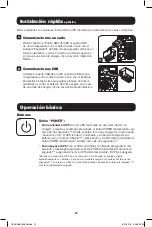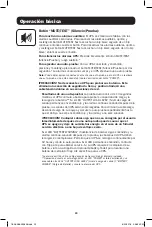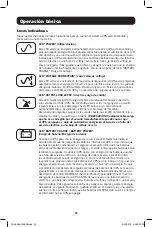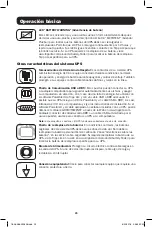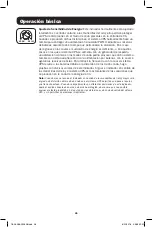
11
Basic Operation
Other UPS Features
Hospital-Grade AC Receptacles:
The receptacles provide connected equipment
with AC line power during normal operation and battery power during blackouts
and brownouts. They also protect equipment against damaging surges and line
noise.
USB or DB9 Communication Port:
These ports connect the UPS to a computer
for automatic file saves and unattended shutdown in the event of a power failure.
Use with Tripp Lite’s PowerAlert Software and appropriate USB or DB9 cable. A
PowerAlert CD and USB or DB9 cable may be included with the UPS; if so, insert
the CD into the computer’s CD-ROM drive and follow the installation instructions.
If PowerAlert Software and the appropriate cable were not included with the UPS,
a free software download is available at www.tripplite.com. Any user-supplied DB9
pass-through or USB cable may then be used to connect the UPS to a computer.
NOTE:
This connection is optional. The UPS will work properly without this connection.
Battery Replacement Door:
Under normal conditions, the original UPS battery
will last several years. Battery replacement should be performed by qualified
service personnel only. Refer to “Battery Warnings” in the Safety section. Should
the UPS require battery replacement, visit Tripp Lite on the Web at
www.tripplite.com/products/battery-finder/ to locate the UPS system’s
appropriate Tripp Lite replacement battery.
Input Breaker:
Protects the electrical circuit from overcurrent draw from the
UPS load. If breaker trips, remove some of the load, then reset it by pressing the
breaker in.
Equipotential Connection:
Use this to connect any equipment that requires a
protective earth ground.
Power Sensitivity Adjustment:
This dial is normally set fully counterclockwise,
which enables the UPS to protect against waveform distortions in its AC input.
When such distortion occurs, the UPS will normally switch to providing PWM
sine wave power from its battery reserves for as long as the distortion is present.
In areas with poor utility power or where the UPS system’s input power comes
from a backup generator, chronic waveform distortion could cause the UPS to
switch to battery too frequently, draining its battery reserves. The frequency in
which the UPS switches to battery due to waveform distortion can be adjusted by
experimenting with different the dial settings. As the dial is turned clockwise, the
UPS becomes more tolerant of variations in its input power’s AC waveform.
NOTE:
The further the dial is adjusted clockwise, the greater the degree of waveform
distortion the UPS will allow to pass to connected equipment. When experimenting with
different settings for this dial, operate connected equipment in a safe test mode so that
the effect on the equipment of any waveform distortions in the UPS system’s output can be
evaluated without disrupting critical operations.
NORM
DELAY
18-06-068-933608.indb 11
6/22/2018 4:56:31 PM






















